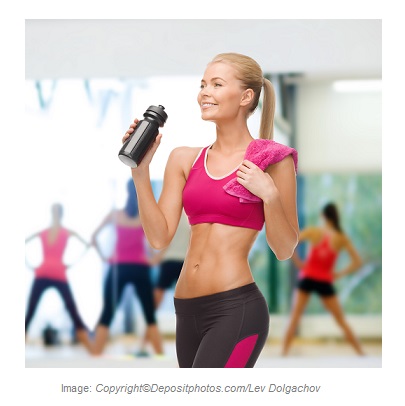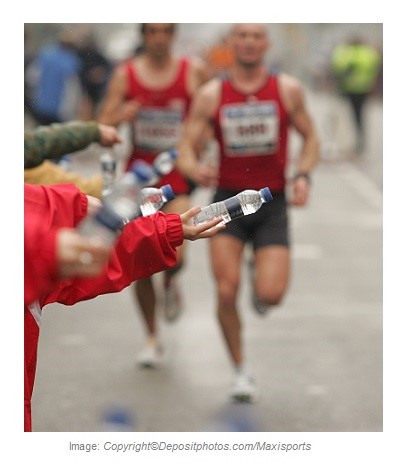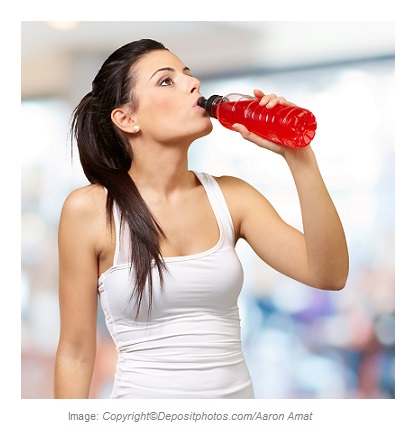A delightful training session requires an optimal hydration. A very small fluctuation in the body`s water balance could adversely affect athletic performance.
We usually lose water through urine, skin (evaporation and sweating), breathing, and stools. During exercise especially in intense and prolonged exercise, we lose water even more through the skin and breathing.
In order to keep the body fully hydrated during training sessions, you should drink ½ to 1 glass of water every 10 minutes. If you are not thirty, it does not mean that you are not dehydrated. Because thirst is not a good sign of how much hydrated you are.
Practically, athletes are taught to evaluate their hydration levels by using the two following guidelines:
- Urgent feeling to urinate during or immediately after training. If you do not have the urge to urinate during your exercise session or within few minutes after exercise, it is a good and reliable sign that you have not taken enough water during your exercise session.
- Color of the urine. This is not as reliable as the first sign. However, it is a useful indicator to assess hydration level. The urine is usually clear like water or slightly yellow. If the color of the urine is strong yellow or orange – colored, it could be a sign of not having enough water during exercise. You should bear in mind that taking some supplements or medications could affect the color of urine. For example, vitamin B2 (riboflavin) makes the color of urine strong yellow.

There are other factors that determine the degree of dehydration during exercise, and they include intensity of exercise, temperature and humidity of exercising environment, and strength or endurance training. Endurance athletes are more prone to dehydration than strength athletes. Regardless of what the sport is, an optimal hydration is a key to athletic excellence, and dehydration can significantly impair athletic performance and even increase tendency to sports injuries.
For dynamics of water during exercise, see “Water” under the section of “General Nutrition”.
Consuming Carbohydrates During Exercise

Carbohydrates are the only macronutrient you are allowed to take during exercise. Taking carbohydrates during training sessions that last less than 60 minutes has no significant impact on athletic performance unless pre – exercise diet did not contain sufficient amounts of carbohydrates.
Consuming carbohydrates during a training session or a sport event that lasts for minimum 90 minutes can improve athletic performance by providing additional fuel to the exercising muscles.
If you are preparing yourself for a competition through longer training sessions with higher intensity, you may benefit from supplementing with carbohydrates. Nonetheless, if your goal is to lose weight and drop body fat, taking carbohydrates during your training sessions will slow down the fat burning process, though you might feel better during your training.
Taking Sports Drinks During Exercise
Taking sports beverages while exercising is very common among Gym-goers and athletes. Any sports drinks that have the following criteria might be an acceptable choice:
- The content of carbohydrate should be less than10%. Beverages with carbohydrate more than 10% should be diluted with water to lower the concentration of carbohydrate.
- The sports drinks should contain potassium and sodium to balance out electrolyte loss. A sport drink without potassium is not a good choice.
- The beverages should not contain any stimulants especially for children. The stimulants, caffeine, guarana and ma huang, will certainly give you a boost in your energy level. However, dependency and failure to distinguish the heart rates between fat burning zone and cardio conditioning zone are the concerns of sports nutritionists.
Some sports drinks may contain adaptogens (licorice, ashwagandha, ginseng, gotu kola, schizandra and echinacea). Consuming sports drinks containing adaptogens or vitamins while exercising has inconclusive effects on athletic performance.
According to traditional Chinese medicine, taking adaptogens while exercising is like “feeding a tired horse”. However, it is common among athletes to take adaptogens (see “Adaptogens” under the section of “Supplementation”).

What to Avoid During Exercise
More often, it is seen that some people are eating or drinking something during exercise that should not be doing that. Not only is not taking the following drinks or foods during an event or training session recommended, but also they may adversely affect athletic performance, and they should be avoided:
- Sodas.
- Juices.
- Fruits.
- Fructose powder.
- Protein shakes.
